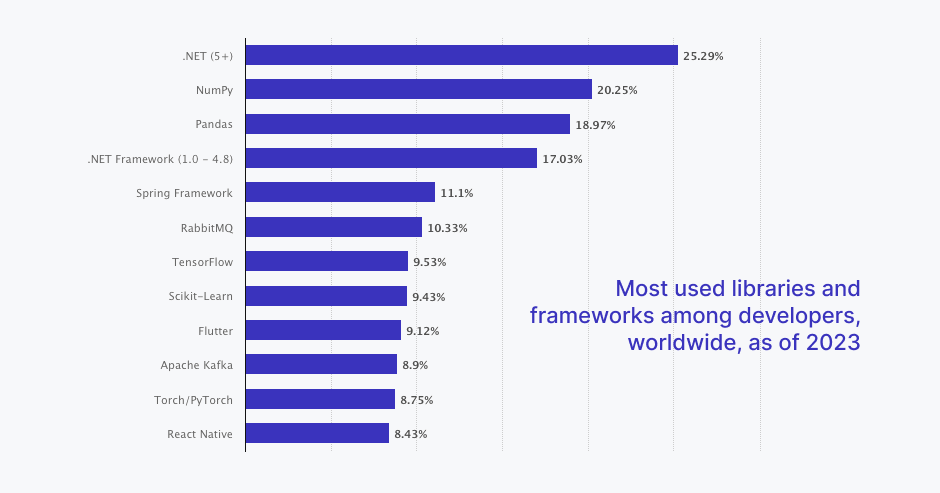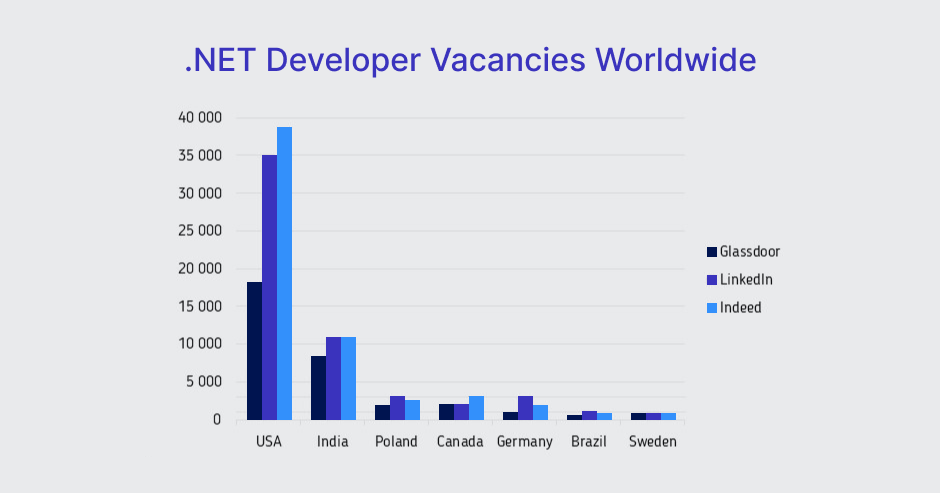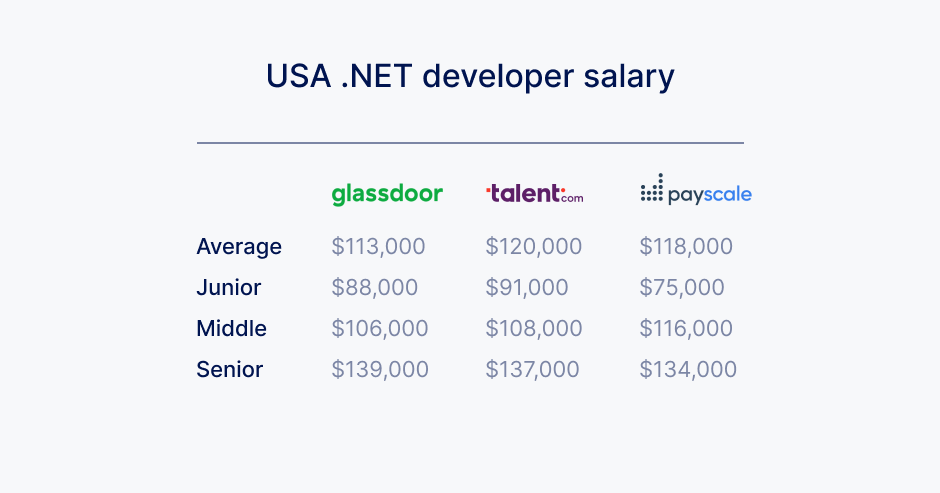As per Statista's latest data, .NET has emerged as a leading framework among developers in 2023. Renowned for its adaptability, user-friendly interface, and versatile functionality, .NET stands out as a favored platform for diverse software and online applications. However, the challenge lies in sourcing skilled and experienced .NET programmers who are in high demand.

This blog delves into comprehensive strategies for locating and hiring proficient .NET programmers essential for your upcoming business ventures.
Also read: Kotlin developer hiring guide
Understanding Your Project Requirements and Desired Skills
Before embarking on the search for a remote .NET developer, it's crucial to have a clear understanding of your project requirements and the skills you're looking for. This will ensure that the developer you hire is well-equipped to handle the tasks at hand and contribute effectively to your team.
- Defining the project scope and timeline: Outline the specific goals, deliverables, and deadlines for your project. This information will help potential candidates gauge their ability to meet the demands of the project and assess whether it aligns with their expertise.
- Identifying the specific technical skills and expertise needed for your .NET developer: List the essential technical skills and expertise required for the role, such as proficiency in C#, .NET Core, MVC, and Entity Framework, as well as any additional skills relevant to your project. This will help you filter candidates based on their technical abilities and ensure that the .NET developer you hire is well-versed in the technologies relevant to your project.
- Considering the level of experience and familiarity with remote work: Remote work requires a unique set of skills, such as strong communication, self-motivation, and time management. When hiring a remote .NET developer, consider their experience in working remotely and their ability to adapt to a remote work environment. This will help ensure that the developer is not only technically proficient but also capable of thriving in a remote setting.
Hire, manage and retain remote tech talent easily, securely and compliantly. Build high-performing tech teams with vetted engineers starting from $50/hour with 30-day risk-free trial →

Sourcing Remote .NET Developers
When it comes to sourcing remote .NET developers, leveraging remote-work platforms and job boards specifically designed for remote developers can greatly improve your chances of finding the right talent. One such platform is Index.dev, which connects companies with top remote developers from around the world.
By utilizing Index.dev, you can tap into a curated list of remote .NET developers and their profiles. This allows you to review their skills, experience, and portfolios at a glance, helping you identify candidates who possess the technical expertise and remote work capabilities needed for your project. Additionally, Index.dev offers the option to post job listings, which can help you attract qualified .NET developers who are actively seeking remote opportunities.
In summary, sourcing remote .NET developers can be made more efficient and effective by leveraging platforms like Index.dev. By exploring their curated list of developers and posting job listings, you can increase your chances of finding the perfect remote .NET developer for your team.
Also read: 8 niche strategies for sourcing remote developers
Evaluating Remote .NET Developer Candidates
Once you have sourced potential remote .NET developer candidates, it's essential to thoroughly evaluate their skills and experience to ensure they will be a strong addition to your team. This process involves assessing their technical skills, experience with remote work, communication abilities, and cultural fit. Additionally, reviewing their portfolios and previous work experience can provide valuable insights into their capabilities and expertise.
- Assessing technical skills and experience with remote work: Evaluate the candidate's proficiency in the necessary technologies and frameworks, as well as their ability to adapt to a remote work environment. Consider conducting technical assessments or coding challenges to gauge their skills and knowledge.
- Evaluating communication abilities and cultural fit: Effective communication is crucial in a remote setting, so assess the candidate's ability to communicate clearly and collaborate with team members. Additionally, consider their cultural fit within your organization to ensure they can integrate seamlessly into your team.
- Reviewing portfolios and previous work experience: Take the time to review the candidate's portfolio and work samples to gain an understanding of their capabilities, quality of work, and ability to deliver on project requirements. This can also help you evaluate their problem-solving skills and creativity, which are essential traits for a successful .NET developer.
In summary, evaluating remote .NET developer candidates involves a thorough assessment of their technical skills, remote work experience, communication abilities, and cultural fit. By taking the time to review their portfolios and previous work experience, you can make an informed decision and select the best candidate for your team.
Also read: Evaluating remote developer portfolios: What to look for
Conducting Thorough Interviews and Technical Assessments
To ensure the remote .NET developers you hire are the best fit for your team, conducting thorough interviews and technical assessments is essential. This process allows you to evaluate the candidate's skills, knowledge, and overall suitability for the role, while also incorporating valuable insights from Index.dev's blog on vetting high-performing tech talent.
- Preparing relevant and challenging interview questions: Develop a set of interview questions that cover both technical topics and soft skills, such as teamwork, communication, and problem-solving. These questions will help you gauge the candidate's expertise in .NET development and their ability to work effectively in a remote setting.
- Administering technical assessments to test the candidate's skills and knowledge: Use coding challenges, technical exercises, or other assessments to evaluate the candidate's proficiency in .NET technologies and frameworks. This will provide a clear understanding of their capabilities and how well they can meet your project requirements.
- Leveraging a remote-work platform: Incorporating insights from Index.dev's vetting high-performing tech talent can further enhance your interviewing and assessment process, ensuring that you select the best remote .NET developer for your team. By carefully evaluating each candidate and considering their technical skills, communication abilities, and overall fit for your organization, you can make informed hiring decisions and build a strong, high-performing remote .NET development team.
Also read: Best Practices for Evaluating Developer Skills: Mastering Technical Assessments
Establishing Effective Communication and Collaboration
Once you have hired a remote .NET developer, it is essential to establish effective communication and collaboration processes. This ensures that your team works seamlessly together and remains focused on project goals. Consider the following strategies for fostering efficient communication and collaboration with your remote .NET developers:
- Setting clear expectations and communication channels from the beginning: Establish expectations for communication frequency, response times, and preferred channels at the outset. This will help your team stay connected and minimize misunderstandings or delays in communication. Be sure to choose communication tools that are accessible and user-friendly for all team members.
- Utilizing collaboration tools and project management software to facilitate teamwork: Implement tools and platforms that enable your team to collaborate effectively, share files, and manage projects with ease. This may include project management tools, version control systems, and communication platforms. These resources will help your team stay organized, track progress, and collaborate in real-time, ensuring that your project stays on track.
- Encouraging regular check-ins and feedback sessions: Schedule regular check-ins with your remote .NET developers to discuss progress, address any concerns, and provide feedback on their work. This will help maintain open lines of communication, keep everyone on the same page, and foster a positive working environment that values continuous improvement.
Establishing effective communication and collaboration is crucial for the success of your remote .NET development team. By setting clear expectations, utilizing collaboration tools, and encouraging regular check-ins, you can create a cohesive and high-performing team that consistently delivers exceptional results.
Hire, manage and retain remote tech talent easily, securely and compliantly. Build high-performing tech teams with vetted engineers starting from $50/hour with 30-day risk-free trial →
Supporting Your Remote .NET Developers
To ensure the success of your remote .NET developers, it's essential to provide them with the necessary resources, support, and opportunities for growth. By fostering a strong remote team through ongoing communication and support, you can create an environment in which your .NET developers can excel and contribute effectively to your projects.
- Providing resources and support to ensure success in a remote work environment: Equip your remote .NET developers with the necessary tools and resources for their role, such as access to documentation, software licenses, and any required hardware. Additionally, maintain open lines of communication to address any concerns or challenges they may face, ensuring they feel supported and valued as part of your team.
- Offering opportunities for professional development and growth: Encourage your remote .NET developers to continuously improve their skills and knowledge by providing access to training courses, workshops, or conferences. This not only contributes to their personal growth but also enhances the overall skillset and capabilities of your team.
- Building a strong remote team through ongoing communication and support: Regularly check in with your remote .NET developers to discuss progress, provide feedback, and maintain a strong sense of teamwork. By fostering an environment of open communication and continuous improvement, you can ensure that your remote .NET developers feel engaged, motivated, and committed to the success of your projects.

Salaries for .NET developers
When hiring .NET talent, experience level matters. Budget, outsourcing considerations, and skill level should all factor into the equation. The more experience a developer has, the higher the salary they may command.
.NET secures a spot in the top technologies for software engineering roles, boasting a peak yearly remuneration of $111,761.
Engaging .NET developers through Index.dev offers cost-efficient avenues without compromising quality. Yet, consider communication, time zones, and cultural alignment.
Elevating Your .NET hiring with Index.dev
Striving for high-performing .NET developers can be a challenging pursuit, but at Index.dev, we excel beyond expectations. Our distinct strength lies in swiftness – we have a proven track record of promptly sourcing talent in intricate niches, and .NET is no exception. Equipped with skilled .NET developers boasting 7+ years of experience, we are poised to help you ace your software development projects.
✅ Our developers are geared for action, ensuring you secure high-performing talent promptly.
✅ Count on us to handpick developers from the top 5%, possessing not only technical expertise but also English fluency and cultural compatibility, ensuring a perfect match.
✅ Our agile process bypasses employment fees and overheads, streamlining your journey from onboarding to project completion.
Also read: Vetting High-Performing Tech Talent: Our Rigorous 4-Step Process